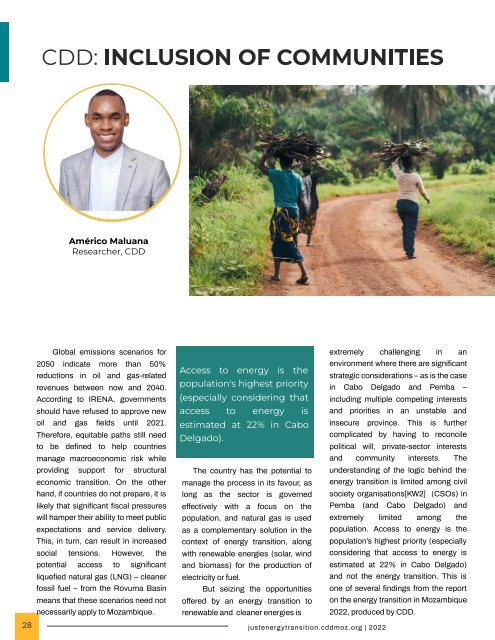2022 Just Energy Transition Conference Report_ENG
With the slogan “Leaving no one behind”, the CDD Just Energy Transition Conference held in Maputo on July 21, 2022, has tracked the challenges and opportunities on energy access and energy transition in Mozambique. Almost 20 speakers from relevant fields contributes and discussed on the promotion of equality of opportunity and social inclusion in investing in affordable, decentralised mixed-energy systems. They remarked on the dimension of inclusion in the energy transition, the youth/gender perspectives and the role of civil society on the ground. How to accelerate access to energy in Mozambique, intensify the deployment of renewable energy, and achieve economic growth? This was one of the main issues discussed on the panels designed scenarios for a transformational policy, implications of international measures on the domestic economy and opportunity to diversify the economy. READ THE FULL REPORT.
With the slogan “Leaving no one behind”, the CDD Just Energy Transition Conference held in Maputo on July 21, 2022, has tracked the challenges and opportunities on energy access and energy transition in Mozambique. Almost 20 speakers from relevant fields contributes and discussed on the promotion of equality of opportunity and social inclusion in investing in affordable, decentralised mixed-energy systems. They remarked on the dimension of inclusion in the energy transition, the youth/gender perspectives and the role of civil society on the ground. How to accelerate access to energy in Mozambique, intensify the deployment of renewable energy, and achieve economic growth? This was one of the main issues discussed on the panels designed scenarios for a transformational policy, implications of international measures on the domestic economy and opportunity to diversify the economy.
READ THE FULL REPORT.
You also want an ePaper? Increase the reach of your titles
YUMPU automatically turns print PDFs into web optimized ePapers that Google loves.
CDD: INCLUSION OF COMMUNITIES<br />
Maluana<br />
Américo<br />
CDD<br />
Researcher,<br />
to energy is the<br />
Access<br />
highest priority<br />
population's<br />
considering that<br />
(especially<br />
to energy is<br />
access<br />
at 22% in Cabo<br />
estimated<br />
Delgado).<br />
Global emissions scenarios for<br />
2050 indicate more than 50%<br />
reductions in oil and gas-related<br />
revenues between now and 2040.<br />
According to IRENA, governments<br />
should have refused to approve new<br />
oil and gas elds until 2021.<br />
Therefore, equitable paths still need<br />
to be de ned to help countries<br />
manage macroeconomic risk while<br />
providing support for structural<br />
economic transition. On the other<br />
hand, if countries do not prepare, it is<br />
likely that signi cant scal pressures<br />
will hamper their ability to meet public<br />
expectations and service delivery.<br />
This, in turn, can result in increased<br />
social tensions. However, the<br />
potential access to signi cant<br />
lique ed natural gas (LNG) – cleaner<br />
fossil fuel – from the Rovuma Basin<br />
means that these scenarios need not<br />
necessarily apply to Mozambique.<br />
The country has the potential to<br />
manage the process in its favour, as<br />
long as the sector is governed<br />
e ectively with a focus on the<br />
population, and natural gas is used<br />
as a complementary solution in the<br />
context of energy transition, along<br />
with renewable energies (solar, wind<br />
and biomass) for the production of<br />
electricity or fuel.<br />
But seizing the opportunities<br />
o ered by an energy transition to<br />
renewable and cleaner energies is<br />
extremely challenging in an<br />
environment where there are signi cant<br />
strategic considerations – as is the case<br />
in Cabo Delgado and Pemba –<br />
including multiple competing interests<br />
and priorities in an unstable and<br />
insecure province. This is further<br />
complicated by having to reconcile<br />
political will, private-sector interests<br />
and community interests. The<br />
understanding of the logic behind the<br />
energy transition is limited among civil<br />
society organisations[KW2] (CSOs) in<br />
Pemba (and Cabo Delgado) and<br />
extremely limited among the<br />
population. Access to energy is the<br />
population’s highest priority (especially<br />
considering that access to energy is<br />
estimated at 22% in Cabo Delgado)<br />
and not the energy transition. This is<br />
one of several ndings from the report<br />
on the energy transition in Mozambique<br />
<strong>2022</strong>, produced by CDD.<br />
28 justenergytransition.cddmoz.org | <strong>2022</strong>




